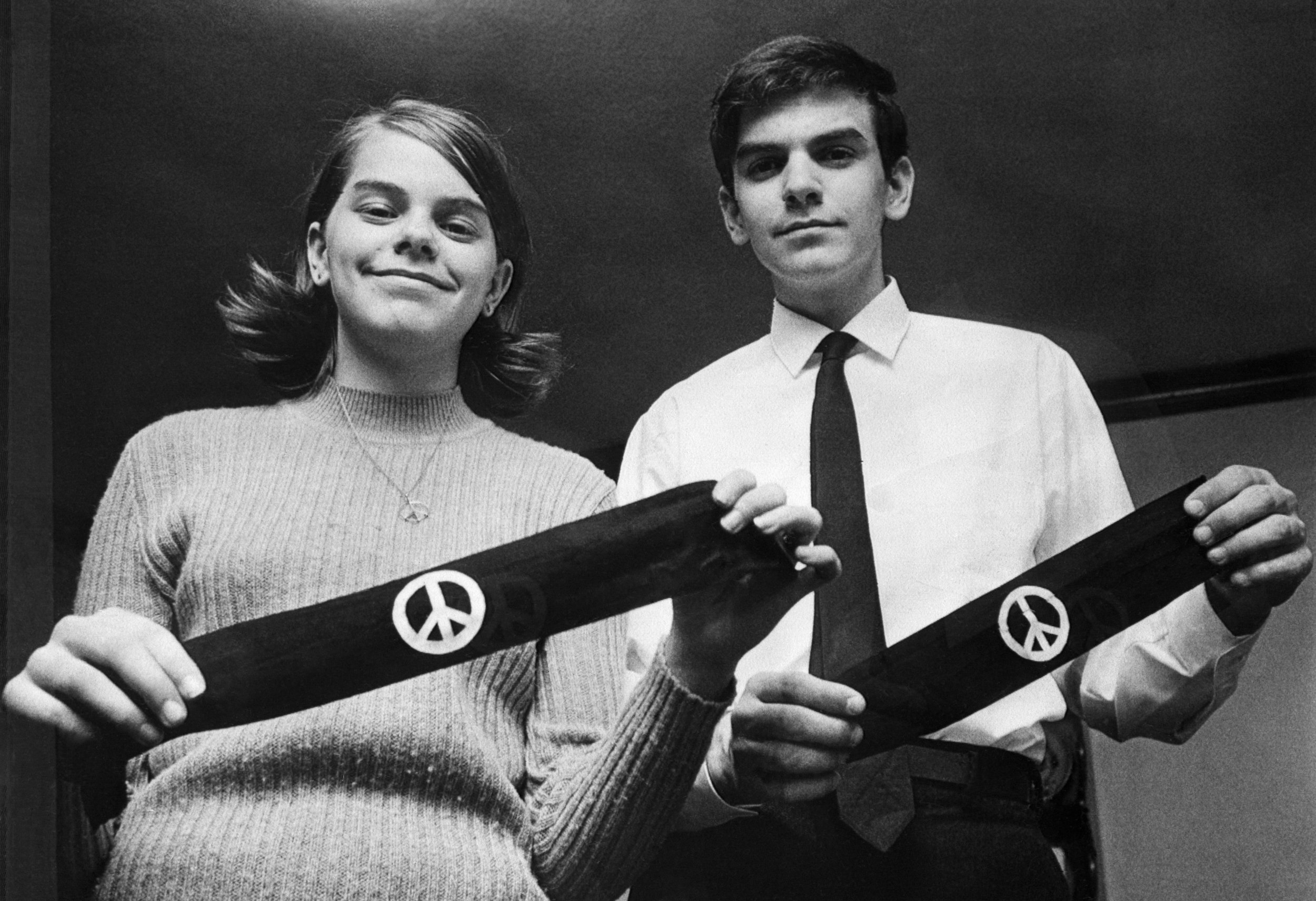Kids Are the Present: John and Mary Beth Tinker Speak at the Old Capital
by Kathryn Raver
On February 24, 1969, John and Mary Beth Tinker pioneered the path for students’ rights to free expression when they won their Supreme Court case regarding their peaceful protest of the Vietnam War. 50 years later, they—along with UIowa Law professor Christina Bohannan and ACLU Iowa Director Mark Stringer—joined University of Iowa students and supporters in the Old Capitol for a discussion about free speech rights—an issue that, unfortunately, is still widely debated on college campuses.
Photo Courtesy of Getty Images
In 1965, the two donned black armbands adorned with peace signs to mourn the lives lost on both sides of the war. The Des Moines School district, upset at this display of “anti-patriotism,” had both Tinkers suspended from school. The family proceeded to take the case to the Supreme Court as a first amendment violation. The court ruled 7-2 in their favor, stating that the Tinkers had a constitutional right to the free expression of their opinions. The case, which was one of the first to address this issue, provided an unprecedented progressive advancement for student’s rights in America.
The opposition the Tinkers faced is certainly not unheard of, even 50 years later. Vast numbers of American citizens are harassed or punished for expressing their beliefs, or the true meaning behind their demonstrations are twisted to paint them as villainous. The Tinkers were called communists for their decision to oppose the violence in Vietnam. However, it was “just a black piece of cloth…” so they acted on “a matter of conscious,” John said, not a matter of following the rules. A similar example of today is Colin Kapernick—the motive behind his choice to kneel for the national anthem has been warped by those who disagree to put him in a negative light.
Professor Bohannan noted today’s “free speech wars,” where many Americans argue that anything they wish to say—including hate speech—should be protected under the first amendment. More often than not, this causes free speech to gain a bad reputation. The benefit to Tinker v. Des Moines, she continued, is that it emphasizes the fact that free speech must be beneficial to all sides. “Free speech” should not include the subjugation or terrorizing of any group. Rather, it should provide the opportunity for Americans to “speak truth to those in power.”
Courtesy of Twitter user @thejess_show
University of Iowa students have taken a similar stance on the matter in light of recent events. Over the past few days, the hashtag “DoesUIowaLoveMe” emerged on Twitter in response to a controversial “Build the Wall” display on the T. Anne Cleary walkway last week. Students are using the hashtag, which is a play on the university’s earlier Twitter campaign “iloveUIOWA”, to speak up about moments in which they feel the university has undermined their ideas and their safety by suppressing diverse identities and allowing hateful speech to flourish. The university thanked those who shared their concerns on Twitter, but has made no further comment at this time.
When asked about the tag, Tinker sided with the students. “I think it’s good that you’re speaking up about your interests and your issues, definitely.” She expressed significant pride in students around the U.S. who are using their platforms—which have been vastly expanded by way of social media—to stand up and speak their minds. “All discriminated groups have been told that they don’t know what they’re talking about,” she continued, “and it’s so not true.” She encouraged students to unapologetically exercise their first amendment rights, as well as to hold school officials and others in positions of power accountable for their words and actions.
As the conversation came to a close, Stringer reminded the crowd that “the answer to bad speech is more good speech.” Students have not only the right but the obligation to speak the truth to those in positions of power. Change won’t come without that. In the words of Mary Beth Tinker, “people always say that kids are the future…I always say that kids are the present.”
Today, Mary Beth Tinker’s “Tinker Tour” makes stops at schools all around the country to educate young Americans on their rights to free expression.



